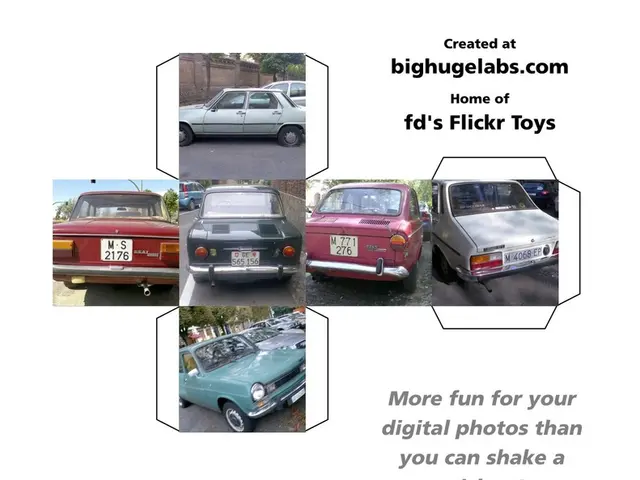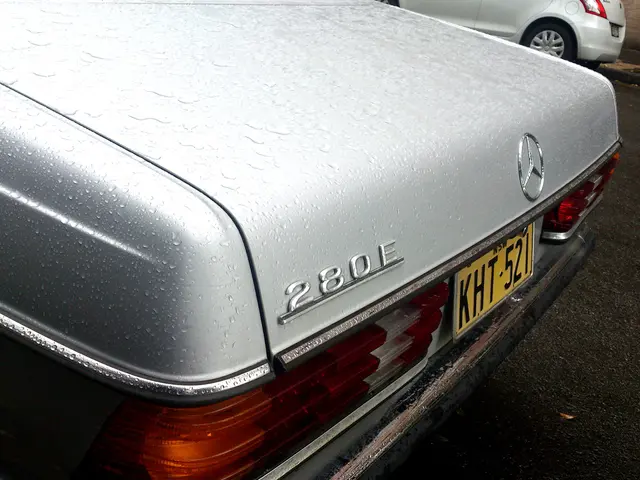Competition for Commercial Vehicle Parking Spots: Driving Group Expresses Concern Over Excessive Congestion - Competition for limited truck parking spaces escalates into a minor skirmish
Germany's highways and rest areas are facing a critical shortage of up to thousands of truck parking spots, according to the Auto Club Europa (ACE), sparking concerns about traffic safety. From mid-April to the end of June, the traffic club conducted a study, revealing that many truckers park incorrectly at rest areas each day after 8:30 PM. Rest areas on the A10 in Berlin and the A24 in Mecklenburg-Vorpommern were found to pose the greatest risks due to poorly parked trucks.
Dirk Engelhardt, spokesperson for the Federal Association of Goods Transport, Logistics, and Disposal (BGL), explains, "After 4 or 5 PM, it's every man for himself in the hunt for parking spots." Unfortunately, the federal government's efforts to alleviate the bottlenecks have not quite hit the mark.
ACE's Findings: Overcrowded Rest Areas in Eastern Germany
Although ACE's truck count is an instant snapshot, it exposed severe overcrowding at 31 checked rest areas in eastern German regions. A total of 2,168 parked trucks were estimated, while only 1,412 spots were available, causing a whopping 50% overcrowding. Dangerous traffic situations, especially during night hours with minimal visibility, were frequently observed in 21 of the checked rest areas. Trucks often parked in the entrance and exit lanes and even on parking spaces meant for cars. Luckily, no trucks were found parked on the highway's shoulder.
The Fichtenplan Süd rest area on the A10 (Dahme-Spreewald district on the southern Berlin Ring) and Stolpe Nord rest area on the A24 (Mecklenburg-Vorpommern) faced the most adverse effects from numerous traffic hazards, according to the survey. ACE conducted this truck count study in view of the "Day of Traffic Safety" on June 21. The investigation was carried out on weekdays and excluded weekend standstill times for trucks. Results will be presented on June 18.
Lack of Amenities and Safety Concerns
The BGL association argues that the lack of truck parking spots often prevents drivers from using restroom facilities. Vehicles parked at rest area entrances and exits put themselves and other road users at risk. The association backs the creation of more off-highway parking spots and streamlining approval processes. Mandating truck parking spots in newly designated industrial areas is also suggested by Engelhardt.
Fear of Worsening Situation with Electric Trucks
The association also fears that the situation could deteriorate in the future due to the growth of electric trucks. As more charging stations are required, three parking spaces without a charging station might become two spaces with a charging station.
A 2023 survey by the Federal Highway Research Institute reveals that there are over 19,500 regular truck parking spots lacking throughout Germany. The number of trucks parked overnight is over 102,000, while the institute reports 82,490 parking spots.
Prioritizing Parking Shortage in the Transport Ministry
The Federal Association of Freight Transport, Logistics, and Disposal considers the shortage of spaces to be more significant, estimating around 40,000 missing parking spots. Although the Federal Ministry of Transport acknowledges the scarcity, it has only managed to add around 3,000 parking spots since 2018. The ministry also advocates the use of telematic parking procedures to improve the efficiency of existing facilities.
- Highway
- Car
- Truck
- Parking Spot
- Rest Area
- Auto Club Europa
- Automobile Club
- Overcrowding
- Germany
- Logistics
- Eastern Germany
- Mecklenburg-Western Pomerania
- Dirk Engelhardt
- Berlin
- Potsdam
Additional Insights
In addressing the truck parking spot shortage, the following strategies are being considered:
- Bookable Truck Parking Services: Companies like SNAP are developing bookable truck parking services across Europe. This enables truckers to reserve parking spaces in advance, simplifying route planning.
- Compact Parking Systems: The German Federal Ministry of Transport and Digital Infrastructure has been testing compact parking systems that optimize the utilization of existing facilities, although their effectiveness is currently limited to only a few locations.
- Investment in New Parking Spaces: The German government plans to invest €400 million over the next four years to expand the number of truck parking spaces, with an annual investment of €100 million.
- Telematics Integration: Telematics integration in parking systems aims to enhance efficiency and capacity management at existing facilities, called up to help alleviate the parking shortage.
- Charging Infrastructure Expansion: With the transition to electric vehicles, the expansion of charging infrastructure will pose challenges if not managed effectively.
- Capacity Management: The integration of bookable parking services and telematics will be pivotal in optimizing the use of existing spaces and future infrastructure.
- To combat the ongoing truck parking spot shortage, companies such as SNAP are introducing bookable truck parking services across Europe, allowing truckers to reserve spots in advance and simplify their route planning.
- The German Federal Ministry of Transport and Digital Infrastructure is testing compact parking systems designed to optimize existing facilities, though their effectiveness is currently limited to only a few locations.








